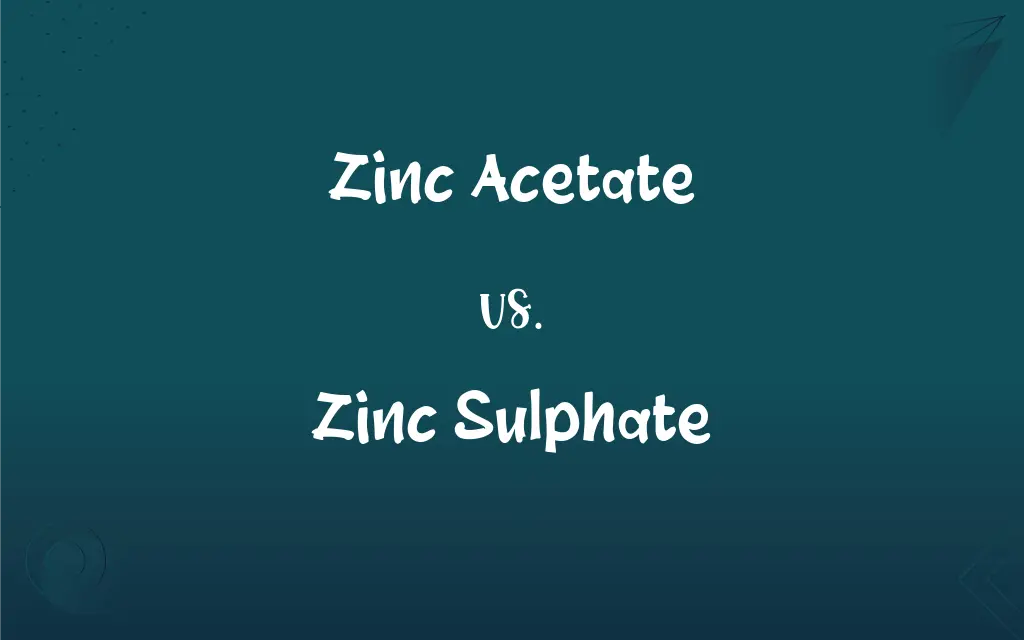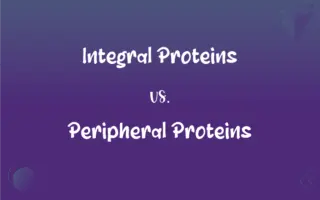Zinc Acetate vs. Zinc Sulphate: What's the Difference?
Edited by Harlon Moss || By Janet White || Published on January 3, 2024
Zinc acetate is a chemical compound used in dietary supplements and medications, while zinc sulfate is often used in agriculture and as a dietary supplement.

Key Differences
Zinc acetate, a salt formed by combining zinc with acetic acid, is primarily used in dietary supplements and as an astringent in topical medications. It is known for its high bioavailability. Zinc sulfate, another zinc salt created by reacting zinc with sulfuric acid, is widely used in agricultural applications as a micronutrient fertilizer and also in dietary supplements. Its solubility in water is a key property.
In the pharmaceutical industry, zinc acetate is utilized for its medicinal properties, such as treating zinc deficiencies and as an active ingredient in lozenges to reduce the duration of common colds. Zinc sulfate, on the other hand, is recognized for its use in oral rehydration therapy and for its effectiveness in treating zinc deficiency in humans.
The chemical structure of zinc acetate allows it to be used in manufacturing and industrial processes, including the production of other zinc compounds and as a catalyst in certain chemical reactions. Zinc sulfate finds its application in textile manufacturing for mordant in dyeing, and it's also used in the production of rayon.
In terms of safety and toxicity, zinc acetate is generally considered safe when used in prescribed amounts, with a lower likelihood of causing gastrointestinal side effects. Zinc sulfate, though effective, may have a higher risk of gastrointestinal irritation, which needs consideration when used in dietary supplements.
The choice between zinc acetate and zinc sulfate in various applications depends on factors like solubility, bioavailability, and specific use-case requirements, illustrating the tailored use of these compounds based on their distinct chemical properties.
ADVERTISEMENT
Comparison Chart
Chemical Composition
Zinc combined with acetic acid
Zinc combined with sulfuric acid
Primary Use
Dietary supplements, topical medications
Agricultural micronutrient, dietary supplements
Industrial Application
Manufacturing of zinc compounds, catalyst in reactions
Textile manufacturing, rayon production
Solubility
High solubility, especially in alcohol
Highly soluble in water
Side Effects
Lower risk of gastrointestinal irritation
Higher risk of gastrointestinal irritation
ADVERTISEMENT
Zinc Acetate and Zinc Sulphate Definitions
Zinc Acetate
Zinc acetate is a salt formed from zinc and acetic acid.
Zinc acetate is often prescribed to treat zinc deficiencies.
Zinc Sulphate
Zinc sulphate is used in the production of rayon.
The rayon industry uses zinc sulphate in its manufacturing process.
Zinc Acetate
It's used in dietary supplements for its high bioavailability.
Zinc acetate supplements are popular for boosting immune health.
Zinc Sulphate
Zinc sulphate is a chemical compound of zinc and sulphuric acid.
Zinc sulphate is commonly used as a fertilizer in agriculture.
Zinc Acetate
It is utilized in industrial processes as a catalyst.
Zinc acetate catalyzes the synthesis of various organic compounds.
Zinc Sulphate
It's used as a dietary supplement to treat zinc deficiency.
Zinc sulphate supplements are effective in combating zinc deficiency.
Zinc Acetate
Zinc acetate serves as an astringent in topical medications.
Zinc acetate is included in some ointments for its astringent properties.
Zinc Sulphate
It finds application in textile manufacturing as a mordant.
Zinc sulphate is used to fix dyes on fabrics during dyeing processes.
Zinc Acetate
Zinc acetate is effective in lozenges for treating common colds.
Lozenges containing zinc acetate can reduce the duration of cold symptoms.
Zinc Sulphate
Zinc sulphate is utilized in oral rehydration therapy.
Zinc sulphate solutions aid in rehydration and electrolyte balance.
FAQs
How is zinc acetate typically used?
It's used in lozenges to treat the common cold, as a dietary supplement, and in some topical ointments.
Can zinc acetate be used topically?
Yes, it's used in topical ointments for its astringent and antiseptic properties.
Is zinc sulphate used in agriculture?
Yes, it's commonly used as a micronutrient fertilizer in agriculture.
Are there any side effects of taking zinc acetate?
Possible side effects include stomach upset and a metallic taste in the mouth.
Is zinc sulphate water-soluble?
Yes, it is highly soluble in water.
Are zinc acetate and zinc sulphate safe for consumption?
Yes, when used in appropriate dosages, both are generally safe as dietary supplements.
What are the side effects of zinc sulphate?
They include nausea, vomiting, and diarrhea, especially when taken in high doses.
What are the common uses of zinc sulphate?
It's used as a dietary supplement, in agriculture as a fertilizer, and in animal feed.
What is zinc acetate?
Zinc acetate is a chemical compound used as a dietary supplement and in various medical applications.
What is zinc sulphate?
Zinc sulphate is an inorganic compound used as a dietary supplement and in agriculture.
What is the chemical formula for zinc acetate?
The chemical formula is C4H6O4Zn.
What is the chemical formula for zinc sulphate?
The chemical formula is ZnSO4.
Can zinc acetate help with cold symptoms?
Yes, lozenges containing zinc acetate can reduce the duration of cold symptoms.
Can zinc sulphate be toxic?
In large doses, it can be toxic, leading to zinc poisoning.
What forms does zinc sulphate come in?
It's available in powder, granular, and solution forms.
Can zinc acetate be used in eye care?
Yes, it's sometimes used in eye drops for its anti-inflammatory properties.
Is zinc acetate effective in acne treatment?
It can be effective due to its anti-inflammatory properties.
Is zinc sulphate used in animal feed?
Yes, it's added to animal feed as a zinc supplement.
How is zinc acetate different from other zinc supplements?
It has a different chemical structure and is more soluble in alcohol than water.
Is zinc acetate suitable for all age groups?
It should be used cautiously in children and under medical supervision.
About Author
Written by
Janet WhiteJanet White has been an esteemed writer and blogger for Difference Wiki. Holding a Master's degree in Science and Medical Journalism from the prestigious Boston University, she has consistently demonstrated her expertise and passion for her field. When she's not immersed in her work, Janet relishes her time exercising, delving into a good book, and cherishing moments with friends and family.
Edited by
Harlon MossHarlon is a seasoned quality moderator and accomplished content writer for Difference Wiki. An alumnus of the prestigious University of California, he earned his degree in Computer Science. Leveraging his academic background, Harlon brings a meticulous and informed perspective to his work, ensuring content accuracy and excellence.































































